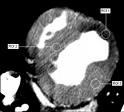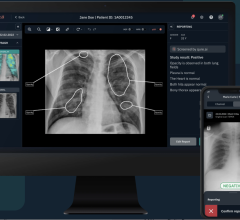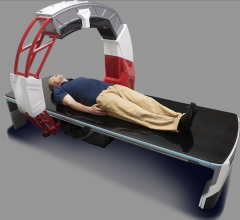
September 18, 2009 - A team of researchers led by Massachusetts General Hospital (MGH) radiologists has developed a computed-tomography-based protocol that identifies both narrowing of coronary arteries and areas of myocardial ischemia in a single examination, giving a better indication of clinically significant coronary artery disease, said a report appears in the September 15 issue of the Journal of the American College of Cardiology.
The MGH-led study was designed to see whether a comprehensive cardiac CT examination could incorporate myocardial perfusion studies in both resting and stress situations along with the anatomic data provided by CT angiography. The study enrolled 34 cardiac patients who recently had SPECT stress tests and were likely to also require angiography via cardiac catheterization.
Participants first had a cardiac CT taken while receiving an infusion of adenosine, which produces physiologic stress symptoms such as elevated heart rate and blood pressure. When vital signs returned to normal several minutes after the adenosine infusion, a resting cardiac CT was taken. Both of those scans involved the use of contrast material, and to detect areas with little or no contrast agent - indicating restrictions to the myocardial vasculature - a third CT scan was taken 7 minutes later.
The accuracy of CT-based perfusion imaging in diagnosing coronary artery narrowing that significantly affected myocardial perfusion was virtually the same as SPECT stress imaging, and the results of coronary CT angiography also compared favorably to those of cardiac catheterization. Because the investigators used new radiation-dose-reduction techniques, the radiation dose of the three CT scans did not exceed the dosage involved in the SPECT stress perfusion study.
Ron Blankstein, MD, of the MGH Cardiac MR/PET/CT Program and the Noninvasive Cardiovascular Imaging Program at Brigham and Women's Hospital (BWH) is the lead author of the Journal of the American College of Cardiology paper. Co-authors of the JACC report are Leon Shturman, MD, Ian Rogers, MD, Jose Rocha-Filho, MD, David Okada, MD, Ammar Sarwar, MD, Anand Soni, MD, Brian Ghoshhajra, MD, Milena Petranovic, MD, Ricardo Loureiro, MD, Henry Gewirtz, MD, Udo Hoffmann, MD, MPH, and Thomas Brady, MD, MGH; Hiram Bezerra, MD, Case Wastern Reserve University; Gudrun Feuchtner, MD, Innsbruck Medical University, Austria; and Wilfred Mamuya, MD, PhD, BWH. The study was supported by grants from Astellas Pharma, Inc. and the National Institutes of Health.
For more information: www.massgeneral.org


 August 09, 2024
August 09, 2024 








